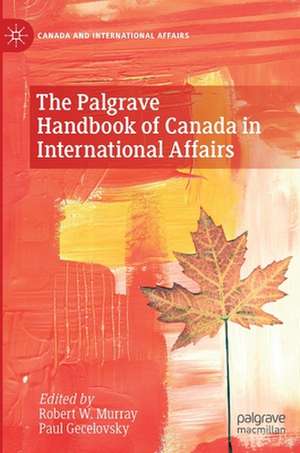The Palgrave Handbook of Canada in International Affairs: Canada and International Affairs
Editat de Robert W. Murray, Paul Gecelovskyen Limba Engleză Hardback – 30 apr 2021
Chapter 22 is available open access under a Creative Commons Attribution 4.0 International License via link.springer.com.
Din seria Canada and International Affairs
-
 Preț: 291.17 lei
Preț: 291.17 lei -
 Preț: 224.32 lei
Preț: 224.32 lei -
 Preț: 400.20 lei
Preț: 400.20 lei -
 Preț: 360.18 lei
Preț: 360.18 lei - 15%
 Preț: 646.94 lei
Preț: 646.94 lei -
 Preț: 386.00 lei
Preț: 386.00 lei -
 Preț: 459.38 lei
Preț: 459.38 lei -
 Preț: 454.92 lei
Preț: 454.92 lei - 18%
 Preț: 888.31 lei
Preț: 888.31 lei -
 Preț: 486.60 lei
Preț: 486.60 lei - 18%
 Preț: 892.74 lei
Preț: 892.74 lei - 18%
 Preț: 777.50 lei
Preț: 777.50 lei - 18%
 Preț: 723.38 lei
Preț: 723.38 lei - 18%
 Preț: 783.05 lei
Preț: 783.05 lei -
 Preț: 419.59 lei
Preț: 419.59 lei - 18%
 Preț: 724.63 lei
Preț: 724.63 lei -
 Preț: 318.29 lei
Preț: 318.29 lei
Preț: 1240.16 lei
Preț vechi: 1512.39 lei
-18% Nou
Puncte Express: 1860
Preț estimativ în valută:
237.31€ • 248.91$ • 197.55£
237.31€ • 248.91$ • 197.55£
Carte tipărită la comandă
Livrare economică 01-15 aprilie
Preluare comenzi: 021 569.72.76
Specificații
ISBN-13: 9783030677695
ISBN-10: 3030677699
Pagini: 765
Ilustrații: XXIII, 765 p. 2 illus., 1 illus. in color.
Dimensiuni: 148 x 210 mm
Greutate: 1.09 kg
Ediția:1st ed. 2021
Editura: Springer International Publishing
Colecția Palgrave Macmillan
Seria Canada and International Affairs
Locul publicării:Cham, Switzerland
ISBN-10: 3030677699
Pagini: 765
Ilustrații: XXIII, 765 p. 2 illus., 1 illus. in color.
Dimensiuni: 148 x 210 mm
Greutate: 1.09 kg
Ediția:1st ed. 2021
Editura: Springer International Publishing
Colecția Palgrave Macmillan
Seria Canada and International Affairs
Locul publicării:Cham, Switzerland
Cuprins
Chapter 1. Introduction.- Chapter 2. Canada and the Challenge to International Order.- Chapter 3. Domestic Politics and Canadian Foreign Policy.- Chapter 4. In Search of: Canada's International Identity in an Emerging Post-Anglo Order.- Chapter 5. Canada, Multilateralism and Multipolarity.- Chapter.6. The Go-Between: Canada's Middle power Options.- Chapter 7. Canada and the UN.- Chapter 8. Slowly but not so surely? Canada's Re-engagement in Evolving Peace Operations.- Chapter 9. Canada's Role in the Evolving Global System and NATO.- Chapter 10. Canada's Changing Role in the G7 and G20.- Chapter 11. Canadian Defense Policy under Trudeau.- Chapter 12. Countering Violent Extremism and Peacebuilding.- Chapter 13. Canada's New Cyper-Powers.- Chapter 14. Canada, Nuclear Weaponds and Ballistic Missile Defense.- Chapter 15. Canada and Trade in the New World Order.- Chapter 16. Climate Change and Environmental Policy and Governance.- Chapter 17. Canada's Arctic Policy Framework in a Changing Arctic.- Chapter 18. Human Rights, R2P and Canadian Foreign Policy.- Chapter 19. Canada in the Evolving World of Development Cooperation.- Chapter 20. Canada’s Arctic Foreign Policy.- Chapter 21. Sport and Foreign Affairs.- Chapter 22. Harnessing Canada’s Potential for Global Health Leadership: Leveraging Strengths and Confronting Demons.- Chapter 23. The Role of Energy in Canadian Foreign Policy: The Undiscovered Country.- Chapter 24. United States – Canada Relations.- Chapter 25. Canada-India Relations: Muddling Along?.- Chapter 26. Canada’s Relationship with China.- Chapter 27. To Engage or to Contain? Canada-Russia Relations in the Shifting International Order.-Chapter 28. Morality as Organizing Principle: Making Sense of Canada-Africa Relations.- Chapter 29. Canada Asia-Pacific Relations: Transforming into a Middle Power Indo-Pacific Stakeholder.- Chapter 30. Canada-EU and Europe Relations.- Chapter 31. Canada and Latin America.- Chapter 32.Canada and the Middle East.
Notă biografică
Robert W. Murray is the President and CEO at Grande Prairie Regional College in Alberta, Canada and a Senior Fellow at the Macdonald Laurier Institute.
Paul Gecelovsky is a faculty member at the University of Windsor and was previously the inaugural Royal Bank Financial Group Fellow in Political Economy in the Department of Economics and Political Science at Western University, Canada.
Paul Gecelovsky is a faculty member at the University of Windsor and was previously the inaugural Royal Bank Financial Group Fellow in Political Economy in the Department of Economics and Political Science at Western University, Canada.
Textul de pe ultima copertă
This book argues that Canada and its international policies are at a crossroads as US hegemony is increasingly challenged and a new international order is emerging. The contributors look at how Canada has been adjusting to this new environment and resetting priorities to meet its international policy objectives in a number of different fields: from the alignment of domestic politics along new foreign policies, to reshaping its international identity in a post-Anglo order, its relationship with international organizations such as the UN and NATO, place among middle powers, management of peace operations and defense, role in G7 and G20, climate change and Arctic policy, development, and relations with the Global South. Embracing multilateralism has been and will continue to be key to Canada’s repositioning and its ability to maintain its position in this new world order. This book takes a comprehensive look at Canada’s role in the world and the various political and policy variables that will impact Canada’s foreign policy decisions into the future.
Chapter 22 is available open access under a Creative Commons Attribution 4.0 International License via link.springer.com.
Robert W. Murray is the President and CEO at Grande Prairie Regional College in Alberta, Canada and a Senior Fellow at the Macdonald Laurier Institute.
Paul Gecelovsky is a faculty member at the University of Windsor and was previously the inaugural Royal Bank Financial Group Fellow in Political Economy in the Department of Economics and Political Science at Western University, Canada.
Paul Gecelovsky is a faculty member at the University of Windsor and was previously the inaugural Royal Bank Financial Group Fellow in Political Economy in the Department of Economics and Political Science at Western University, Canada.
Caracteristici
Offers accessible and original engagement with contemporary Canadian Foreign Policy by some of the top names in the field Examines the impact of an increasingly multipolar world order on Canadian domestic and foreign affairs Shows how Canada is strategically repositioning itself as a strong middle power
